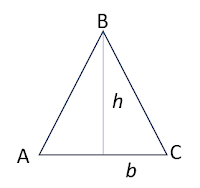Mensuration
In
this Chapter, we are going to recap the basic knowledge regarding
“Mensuration". The following descriptions are summarized for preparation of
past paper practice and if you do not know something, you can contact us.
Area
- Rectangle - $l \times b$, where l=length, b=breath
- Trapezium - $\frac 12 (a+b)h$, where a=length of one parallel side, b= length of the other parallel side, h= height between parallel sides.
- Kite - $\frac 12 a \times b$, where a and b are diagonals.
- Triangle - $\frac 12 \times bh$, $\frac 12 ab \times sin\angle C$
The Circle
- Circumference = $\pi d$= $2\pi r$, where d= diameter, r= radius, $\pi$=3.142….
- Area = $\pi r^2$
- $A= \frac {\theta}{360}\times \pi r^2$
- $l=\frac{\theta}{360} \times 2 \pi r$ , where l=arc length
Chord of a circle
Chord = AB
The Shaded Region = minor Segment
The unshaded Region
(whole circle except minor segment) = major segment
In $\odot O$, If OC
$\perp$ AB, then C is the mid point of AB and vice versa.
Area of Minor segment
= Area of sector – Area of Triangle
Volume
Prism- $A \times l$, where A= area of cross section , l = length
Cuboid – a prism
with six faces being rectangles
Cube – a prism with six faces being squares
Cone - $\frac 13 \pi r^2h$
Surface area
- Cylinder - $2 \pi rh$
- Sphere - $4 \pi r^2$
- Cone - $\pi rl$, where l = slant height
Congratulations!
You are ready to practice past papers. you can click Home button and choose the
post you would like to practice. See you in the next chapter

















0 Comments